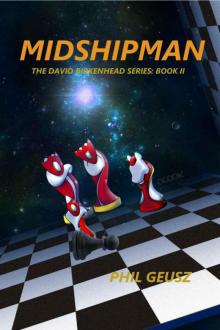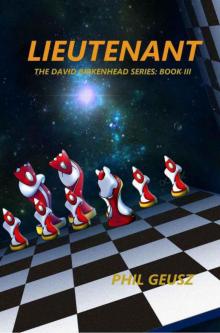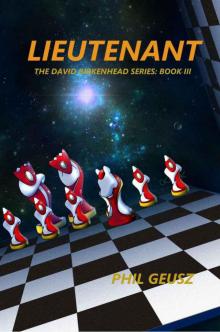- Home
- Phil Geusz
Commander Page 3
Commander Read online
Page 3
During this period I also moved into my own house on my own land. The papers made a huge fuss over it, since legally I wasn’t entitled to own so much as a square inch of real estate. They were on my side, however—the articles pleaded with the House of Lords to make a special one-Rabbit exception for me. This wasn’t at all what either His Majesty or I had in mind, however—at least not in the long term. We wanted property rights for everyone, and so far as I could see the best way to subtly keep pushing for them was to remain in open, gross violation of the law as it stood and dare the authorities to try and enforce the statutes against me. Part of me didn’t like this hero-based strategy very much; late at night I still wondered sometimes if I’d have been found guilty of Captain Holcomb’s murder if my Rabbits and the rest hadn’t gone on to do so much damage to the Imperials. On the one hand I still couldn’t see how I could’ve done anything any differently and still performed my higher duty, but on the other it was clear that I’d at least to a degree been whitewashed simply due to who I was. I didn’t like that I was exploiting my public status in order to subvert the legal system—it seemed to me that if there was a law against Rabbits owning land then I simply shouldn’t have any. But the cold fact was that this was clearly the best way to advance the cause of Rabbits everywhere, whether it was the most ethical course or not. Maybe politics were like war, a special case where the normal rules of right and wrong not only didn’t apply but couldn’t even conceivably be made to apply?
It was a depressing thought, one that darkened what should’ve been a very happy moving day. After living in Uncle Robert’s cabin for so long I decided that I very much preferred primitive over palatial living. While I could’ve afforded either—the still-free serfs of Marcus, meaning those not under the Imperial yoke, took up a huge interstellar collection to help set me up in my new home—I chose to build a simple cabin very much along the lines of the trout lodge. Being a primary residence it had to be considerably larger, of course; someday I’d be entertaining important guests and the like. And for the same reason I also included indoor plumbing and a hardpoint capable of supporting the launch of small Field-driven spacecraft. But otherwise my new home was rustic in the extreme. Both inner and outer walls were made of genuine dead-tree logs, and the heat came from fireplaces and stoves. I was also forced to try and find an estate manager to take care of the place when I was gone—which would be most of the time, given the nature of my career and next assignment. At first I was perplexed when no one answered my ads—I’d offered what I thought was quite a generous salary for not much work. Then one day the truth struck me and I realized that no human wanted to be employed by a Rabbit, no matter what he’d accomplished for his kingdom. So I visited the Zombie Rabbits and asked them if they’d be willing to take the job on for me. The whole gang volunteered before I could even name the salary—my old friends were going insane with boredom by then. So I installed Fremont and Snow as estate supervisors and put the rest of the Rabbits to work under them, allowing them to build their own homes pretty much wherever they liked.
“I encourage you to settle in and start families,” I explained to them on the day they arrived. “On the Marcus worlds, Rabbits live free and unsupervised—being owned isn’t much more than a formality for us. And that’s how I want things to be here.” I grinned. “Except that you’re not owned anymore, of course. So maybe things can be even better still.” There was some grumbling about this in the papers when word got out, but nothing serious. After all, people told themselves, I was a both a Marcus and a Rabbit myself. Of course I’d spoil the staff terribly—it was only to be expected. Slowly, bit by bit I withdrew myself from the day-to-day affairs of the property and let my bunny-trust make more and more decisions. Soon flowers—mostly fire-lilies—were blooming everywhere, and I found myself in possession of a beautiful, fragrant mountain meadow home that I wouldn’t trade for any six of the other Marcus palaces. My estate bordered on the mother-House’s grounds—if an emergency arose, my Rabbits knew where to turn for help. Thus I was able to live in a peaceful, worry-free manner, at least in regard to my domestic arrangements.
So at least I had pleasant surroundings as well as peace and quiet to work in as I planned out the space fencibles. It was just as well, because I needed plenty of both. The problems were staggering in depth as well as in scope. For example, no one had any clear idea of what our mission and purpose was to be. It was obvious enough that a plethora of small craft would be immensely useful to the “real” navy in the event of an invasion. There were always urgent supplies to be shipped and personnel to be shuffled about if nothing else, and only a space neophyte would fail to realize what a continual, annoying drain these essential activities were on a warship of any size. Yes, my fencibles could assist with these matters in time of war, and if we did no more the line-of-battle types would be grateful as could be.
And yet… Wasn’t there anything else we could do?
Soon I was listing mission after potential mission for the fencibles, everything from emergency satellite repair under fire to manning listening posts to inserting spies behind enemy lines. In a few hours I had pages and pages of ideas, enough for me to understand that it was impossible for anyone to foresee all the potential situations that might arise. It was sort of liking trying to divide the infinitely unlikely by a limitless number of possibilities. In the end I’d recreated the navy’s mission itself, which was to control space and win wars no matter what circumstances arose. And for all His Majesty’s support and patronage, I doubted that I’d be receiving enough funding for battleships and drydocks! So it was going to have to be all about flexibility, I decided. I’d try to create the most capable, diverse small-craft fleet I could, and let the chips fall where they may. It wasn’t a good plan, perhaps, but as near as I could tell it was the only plan.
Nor did I have any idea what might await me on Marcus Prime in terms of available equipment. Certainly the Imperials would leave at least some operational spacecraft behind; modern civilization depended upon them as thoroughly as it did on railroads. What they failed to leave would be replaced almost immediately, just as soon as it could possibly be managed. But… Where would things ultimately level off? I had the prewar statistics to work with, but how much had changed since then? What little solid intelligence data leaked out of the Empire these days never trickled down anywhere close to my paygrade, so I was working blind. And yet for my planning to be worth the paper it was scrawled upon I had to be able to estimate how much money His Majesty would have to offer in order to tempt a shipowner to sign up for the fencibles, and how many weekends a year I could demand the loan of his vessel and crew for training. Then I had to calculate how many training session would be the minimum to make said crew actually useful to anyone, and…
…soon I’d be lost in thought again, my mind spinning out of control as it skidded across columns of uncertain figures and unknowable details.
The fact was, I soon established, that this job was going to have to be done by the seat of my pants once I arrived home, no matter how much I might wish otherwise. I’d thought it was a huge task back when King Albert had assigned it to me, and now I realized that I’d grossly underestimated it even then. So I gulped, then grasped at the one straw I’d been offered. His Majesty had permitted me the privilege of selecting a few key subordinates. Carefully I set aside my useless musings and began working up a list of names.
If I could exert no control over “what”, “where”,” why” and “how”, at least I had a good handle on “who”.
6
Marcus Prime had undergone a terrible ordeal under Imperial occupation, and it took only a few seconds for an outsider to begin to appreciate just how awful it must’ve been. Our special shuttle was the first to land on the freshly-liberated planet; both James and Uncle Robert had insisted that this be so regardless of the danger. We set down by the family palace, on practically the same spot that James and I had departed from aboard the Broad Arrow what seemed like foreve
r ago. But the only thing familiar about the place was the taxiway pattern.
Everything else was ruins, ruins, ruins as far as the eye could see. Milord’s residence was a burned and sacked mess, the neat and efficient little hanger-complex reeked as if it’d been used to house pigs, and the acres of carefully-manicured lawns had transformed themselves into an unkempt mass of weeds. Not a single fire-lily remained—they’d been systematically extirpated. “We will rebuild,” James declared as his foot touched the ground. “Immediately.” He’d intended to say something much more florid and historical-sounding, I knew, for the benefit of the handful of reporters we’d allowed to ride along with us. But my friend always had a knack for finding the right words at the right time, and this time less was definitely more.
“Wow!” Jean declared as he followed me through the hanger complex. It was the nearest thing I’d ever had to a home, and everywhere I looked I kept finding the ghost of my father. “They’ve really done a job on all this, haven’t they?”
I nodded wordlessly. Jean le Vorsage was one of the handful of cadets who’d treated me well back during my miserable months at the academy. I’d tutored him in math, as I had several other cadets. Unlike them, however, Jean was genuinely gratefully for my help and never resented that it came from a Rabbit. He’d even shared a lunch table with me whenever the opportunity arose. This was one of four reasons I’d selected him to act as my chief deputy in setting up the space fencibles. The second was that he was Heir to the House of le Vorsage. One caught more flies with honey than with vinegar, and my recent inability to find an estate supervisor willing to work for a Rabbit had taught me much about my true status in the world. Yes, I was a famous hero. But I wouldn’t remain popular very long if I tried to assert my new authority too directly on humans. Within the military, my rank badges and reputation were all I needed. Outside, however… Jean was a lordling in his own right, socially acceptable in every conceivable venue, and I expected things would go more smoothly for everyone if I worked through him as much as possible. Thirdly, Jean was charismatic and personable—I suspected that he could sell a snake shoes if he were ever of a mind to, and I planned to put him to work doing exactly that. And fourth but far from least, I outranked him. This was a rare qualification indeed, considering how terribly junior an officer I was. Jean was a lieutenant too, but my seniority was greater than his. The entire space fencibles, in fact, was perforce going to have to be led by the lowest-ranking officers in the entire navy. I vaguely suspected some sort of underlying purpose in this—His Majesty remained intent on overhauling and reforming his fleet despite his recent victory, and I knew from his own mouth that he thought no more of his officer corps as a group than I did. But the king was operating at a far higher level than I was—in the end I had a job to do and limited resources with which to perform it. That was all that could matter to me, for the foreseeable future at least.
“Is this where you used to live?” my old friend Heinrich asked. He was still a midshipman, but couldn’t remain one for very much longer now. All of my top-achieving classmates—or most nobly-blooded classmates, in some cases—were being promoted these days. While Heinrich had graduated at the very bottom of our class, it hadn’t been because he lacked potential. Being part of the academy’s wargaming team—or, more precisely, participating in our tournament against the Imperial equivalent-- had changed his whole outlook on life. Where once he’d been slovenly and brilliantly defiant, now his jet-black Royal Marine uniform was always immaculate and his shoes brightly polished. While Heinrich wasn’t the mathematical genius that his father was, he remained the only classmate I could enjoy discussing Field theory with despite his lack of any sort of formal certification. He too had sought to become an engineer and found something very different instead, and perhaps this was part of why I liked him so much. The fencibles could never begin to be as structured and disciplined an organization as the marines—they’d remain civilians at heart, and it’d be best to accept this up front and go with the flow as much as possible. But we’d still need some of Heinrich’s iron discipline here and there in the organization. I planned to tap it in full, along with his hopefully still-fresh memories of what it’d been like to rebel against said discipline. A middle ground needed to be worked out, and I couldn’t think of a better man to help me find it.
“The next hanger over,” I said, jerking my chin in that general direction. “Dad’s dirtside office was there. He and I lived in back. I… I mean…”
Fremont sighed. “I’ll go first if you like, David.”
I smiled at my fellow Rabbit. Fremont might be getting on, but the former slave still had a few good working years left in him. He and Snow—who I’d left in charge of my estate back home for the moment, as he was still recovering from the psychological trauma of leading one of the bloodiest assaults in Royal history—had begun to emerge as leaders back on Zombie. Along of course with poor Devin, who’d died along the way. Both Fremont and Snow were key pieces of the puzzle, though I still wasn’t quite sure how they fit in. Many if not most of the ordinary crewmen aboard the vessels that would someday make up the fencibles would be Rabbits. It was important that I somehow be able to show the others that they could achieve and grow in the navy too, that I wasn’t a special and unique case. Fremont and Snow were just the Rabbits for that. Neither held formal ranks; our society hadn’t yet progressed enough to allow for that. But not having a rank could be made to cut both ways at need, and if worst came to worst, well… God help the human that attempted to abuse Fremont, after all he’d already been through!
“Or I could go,” Nestor suggested with a big smile. I’d offered him the caretaking job back home on a permanent basis, with the intent that he take over once Snow was fully recovered. But he’d begged me to keep him on as my personal attendant instead. Of all the Zombie Rabbits, Nestor had ultimately proven the most literate and interested in learning. He read constantly these days, and took such formal classes as were available to him. Just on the way out from Earth Secundus alone, he’d earned his high-school equivalency certificate and begun an advanced first-aid class. Heinrich in particular had taken a liking to the little Rabbit and was training him in marksmanship and the martial arts, of all things. He was turning into a regular renaissance-bunny, Nestor was! We freed Rabbits were just full of surprises, apparently, and so far as I was concerned the ex-cabin boy was growing best and fastest of us all. It was a miracle, considering where he’d been and what he’d endured. But it was the happiest one I’d ever witnessed.
“Let’s all go together,” I declared, though in truth I didn’t want to go at all. The fact was that I’d still not gotten over my father’s death. He’d died heroically, doing his duty to the very end and knowing full well that he’d never make it out of the engine room before all hell broke loose. The last few ergs of power my father nursed from the failing ship’s drive had saved James’s and my lives, though he’d not lived to see it. There’d never been a funeral, I’d never had a chance to mourn, and, well… I was tearing up at just the thought of revisiting my once-happy little home. So I stepped forward briskly, trying not to let the others see how badly affected I was.
But in the end I was spared. “Lieutenant Birkenhead!” a welcome voice barked out. It was that of Colonel Amaroo, the army officer in charge of re-securing and policing the capital area under martial law. He was currently the ranking officer dirtside. Amaroo was a good and kindly sort of man until crossed, and had without actually out and out saying so made it clear how much he respected me. This wasn’t an easy thing for a senior officer to manage with a junior.
“Son, that’s area’s still off limits—it hasn’t been swept for booby-traps yet. Please, stay closer to the ship!”
“Aye-aye, sir!” I responded, turning away from my old home. Then I smiled at my friends. “That’s okay. I can always come back tomorrow.”
But I didn’t, of course. Or any other day, until finally the whole area was bulldozed for the new, improved spa
ceport. For I loved my father very, very much. And I wanted to remember the place where I’d spent so many happy hours with him the way he’d left it, not as befouled by marauding Imperials.
7
“…and fourteen Class II ground to orbit shuttles,” I explained to the rest of my little staff at our afternoon meeting a week later. “That’s the whole fleet.”
“Good lord!” Jean murmured. “There’s not even enough lift capacity left to keep the orbital infrastructure up and running!”
“The only reason the Imperials left even that much is because it’s all junk,” I answered, scowling. “Only one of the shuttles is certifiable to carry passengers, and its permit is long-expired.” Then I shook my head. “I’ll grant that things look pretty bleak—I mean, no one can create an auxiliary fleet out of nothing. But we can make this into an opportunity. Within weeks you can bet that my House will be bidding for vessels all over Royal space and maybe even beyond, to alleviate the shortage. Plus, once word gets out of what a mess we’re dealing with here independent shipmasters from all over will be dropping out of hyperspace seeking high-value cargo and easy profits. Maybe we can persuade a few of them to sign up?”
“Maybe,” Heinrich replied, looking out the window. “But… Will they be the ships we really want? I mean… David, they’ll have engines manufactured on a hundred planets, and will require just as many kinds of spare parts. Plus, the independent operators won’t have roots here. Maybe—just maybe!—they’ll sign a contract. But in the event of war, they won’t be fighting for their homes and families like the locally-owned ships. Their hearts won’t be in it. Less-than-fully-committed fighting men are worse than useless and you know it, sir.”

 Descent Book 1: Descent from Man
Descent Book 1: Descent from Man Ship's Boy
Ship's Boy Early Byrd
Early Byrd Admiral (The David Birkenhead Series)
Admiral (The David Birkenhead Series) Commander
Commander Commodore (The David Birkenhead Series)
Commodore (The David Birkenhead Series) Commander (The David Birkenhead Series)
Commander (The David Birkenhead Series) Midshipman
Midshipman Lieutenant
Lieutenant Ship's Boy (The David Birkenhead Series)
Ship's Boy (The David Birkenhead Series) Midshipman (The David Birkenhead Series)
Midshipman (The David Birkenhead Series) Lagrange
Lagrange Commodore
Commodore Admiral
Admiral Lieutenant (The David Birkenhead Series)
Lieutenant (The David Birkenhead Series)